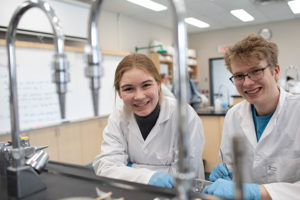As a student ambassador for CMU, I spend an evening a week having conversations on the phone with grade 12 students from across Canada. Almost all of the time, I talk to two kinds of people about their post-secondary plans, goals, and dreams.
The first type are those rare students who seem to know exactly what they’re going to do with their lives: the aspiring doctors, nurses, and veterinarians. They’re often the hyper-motivated ones, and they’re probably admired by the adults and teachers around them and ever-so-slightly feared by their classmates.
The other type, the wide majority of students I talk to, are the ones who don’t really know what they’re going to do with the rest of their life and would like it if you would stop interrogating them about their future, thank you very much. These students, like most of my classmates in grade 12, haven’t made solid plans for university or work yet and aren’t sure what they want to do.
So if you’ve ever been asked about your future and have no clue how to respond, I feel your pain. One of my friends in high school got so tired of being asked what she “wanted to be” by everyone she met, she resorted to one answer: a pirate. In my opinion, that’s actually not a bad choice.
I enrolled at CMU in the Bachelor of Music program, taking classes like Music Theory and Music Skills and History of Music… you get the idea: all music, all the time. In grade 12 I had auditioned on the piano for CMU’s School of Music, and I had a picture in mind of becoming a music teacher or band director, like the teachers I’d most admired in high school. I wasn’t really sure this was the right choice, but it was enough of a plan for a first year. I knew that I wanted to study music, so I did.

What I wasn’t expecting was that even though I was in a relatively structured program, taking mostly pre-determined courses, I would end up discovering some entirely different interests. I took a biology course as an elective, just because I liked biology and I had the high school prerequisites.
But as I continued with the course, I found that I was more and more interested in science. I had the chance to have deep conversations with professors who worked in their fields and who could answer questions about potential careers. My professors were researching interesting things like self-regenerating flatworms and strange parasites that live inside three different animal hosts over their lives.
The more I talked to them and the people in my biology classes, the more I found myself drawn to the whole field. By the end of the semester, I was more conflicted about what I “wanted to do” than at the beginning. By the end of the school year, I was ready to switch majors.
This often surprises people, and I get a lot of questions about how it was possible to make such a big change in my university plan. The answer is that I would never have been able to make that choice confidently without all the resources that CMU offers, from academic advising to career planning and everything in between.
If you’re a high school student perilously close to graduation, you know there’s a ton of pressure to have a plan for your career and life, or at least that’s what it feels like. Choosing a university and a degree can seem like a massive, life-changing decision.
But no matter what classes you take at university, the most important part is not the material you’ll learn. What’s far more valuable are the skills you develop in those classes and the things you discover along the way. University can reveal new options you never considered before.
– Malcolm Reimer, 2nd-year Science student

